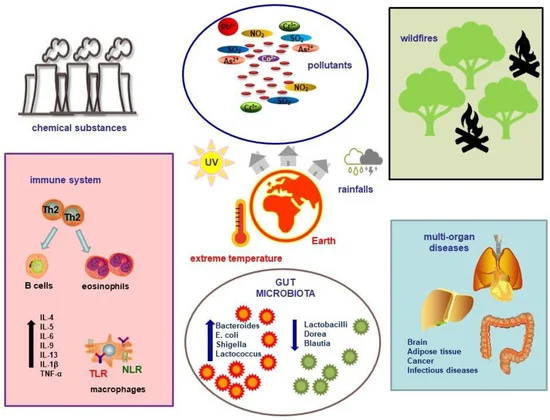In a contemporary setting, climate change is a paradigm shifting concern in our world. Its impacts include changes in the weather cycle such as increase in extreme weather events, melting of glaciers, sea level rise, flooding, and frequent droughts. But it does not stop there; it has extended its claws towards humans by influencing our immune system, the very defence mechanism of our body against diseases and infections.
The Immune System Under Stress: How Climate Change is Affecting Immunity
Exposure to heat as the temperature rises weakens our immune system, making humans more susceptible to infections. The function of immune cells that are crucial for defending the body against pathogens is compromised. Heat stress is also responsible for cardiovascular and respiratory diseases. The change in temperature not only causes heat stress but also brings about a combo pack of disease vectors like mosquitoes, ticks and fleas. The warmer zones facilitate a perfect habitat for such organisms. These organisms are responsible for vector-borne diseases like malaria, dengue fever and Lyme disease. The situation is worse in areas that were relatively colder before, but now are experiencing warm weather. The immune systems of the populations residing in such areas are not accustomed to deal with the associated diseases, hence the introduction of such vectors affects them immensely. Another major consequence of climate change is the hike in air pollution. Inhalation of polluted air leads to chronic inflammation in the respiratory system rendering it defenceless in case of infections like influenza and COVID-19. The next big question is of food and water security, two of the most essential elements for sustaining lives. With droughts, agricultural production has taken a hit and malnutrition is more prevalent. The contaminated water due to floods has not spared human lives either. Waterborne diseases like cholera, jaundice, diarrhoea, etc., are widespread. The polluted water might also be used for irrigation purposes, further plummeting the food production and quality.
The Interplay Between Climate Change and Autoimmune Disorders
The reach of effects of climate change are not restricted to infectious diseases, but also extends to autoimmune disorders. Changes in temperature, humidity and exposure to ultraviolet radiation alters the immune system in many ways. UV radiation suppresses certain immune functions and responses, leaving destruction in its wake. Normal body cells can turn into tumour cells and radiation exposure can also cause diabetes and thyroid diseases, among other autoimmune diseases like lupus. It is without a doubt that climate change is altering our natural immunity bit by bit. How long will it be before we lose resilience passed down to us through evolution? And who is to say that the mutations in the immune system will make us strong beings in the face of adversity that is climate change? It certainly makes you ponder on such questions given the obvious implications.
Climate Change Mitigation
It is our collective responsibility towards our planet to take necessary action for such an arising concern. Efforts to reduce air pollution and greenhouse gas emissions are pivotal in taking a step towards rectifying the situation and protecting our immune health. Access to healthcare facilities in remote areas of low-income and middle-income countries can help its population sustain by withstanding the impacts of climate change on their health. Vaccination programs against infectious diseases are one way to go about it. Additionally, researching new therapies and interventions to boost immune health can provide some relief for this urgent problem. Individually, we can try to achieve proper nutrition and stress management for excellent health.
Thus to conclude, climate change is more than an environmental issue, it entails a public health crisis with implications on the immune system. Climate change challenges the adaptation of humans to the new, altered environments. Understanding and addressing the impacts of this phenomenon is the top priority. By establishing the links between climate change and immune health, we can take proactive steps to protect public health in a rapidly changing world.

Deeksha, is a Biochemist and an aspiring neuroscientist. Her research interest lies at the intersection of molecular neuroscience and drug discovery.


